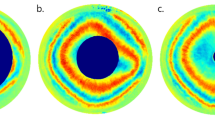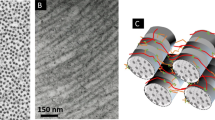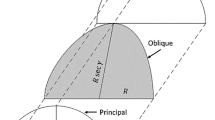Abstract
THE lens of the eye can be considered as a transparent sac of proteins and as such should be amenable to examination with transmitted polarized monochromatic light. The results obtained when the lenses of sheep, lambs, steers, calves, dogs and rabbits were examined for their capacity, in vitro, to rotate the plane of polarized monochromatic light are reported.
This is a preview of subscription content, access via your institution
Access options
Subscribe to this journal
Receive 51 print issues and online access
$199.00 per year
only $3.90 per issue
Buy this article
- Purchase on Springer Link
- Instant access to full article PDF
Prices may be subject to local taxes which are calculated during checkout
Similar content being viewed by others
References
Schellman, J. A., C.R. Lab. Carlsberg, 30, 363 (1958).
Jirgensons, B., Arch. Biochem. Biophys., 85, 532 (1959).
a, Bellows, J. G., Cataract and Anomalies of the Lens, 182 (C. V. Mosby Co., St. Louis, Mo., 1944); b, ibid., 183.
Morner, C. T., Z. physiol. Chem., 18, 213 (1894).
Burky, E. L., and Woods, A. C., Arch. Ophthalmol., 57, 464 (1928).
Nordmann, J., Biologie du Crystallin, 141, Table xxiv (Masson et Cie., Paris, 1954).
Author information
Authors and Affiliations
Rights and permissions
About this article
Cite this article
KIRSCHENBAUM, D. Optical Rotatory Capacity of the Lens of the Vertebrate Eye. Nature 193, 392–393 (1962). https://doi.org/10.1038/193392a0
Issue Date:
DOI: https://doi.org/10.1038/193392a0
Comments
By submitting a comment you agree to abide by our Terms and Community Guidelines. If you find something abusive or that does not comply with our terms or guidelines please flag it as inappropriate.



